DURBAN, WRAPPED
Mahā, Pink Duck and Monroe do the inner city proud
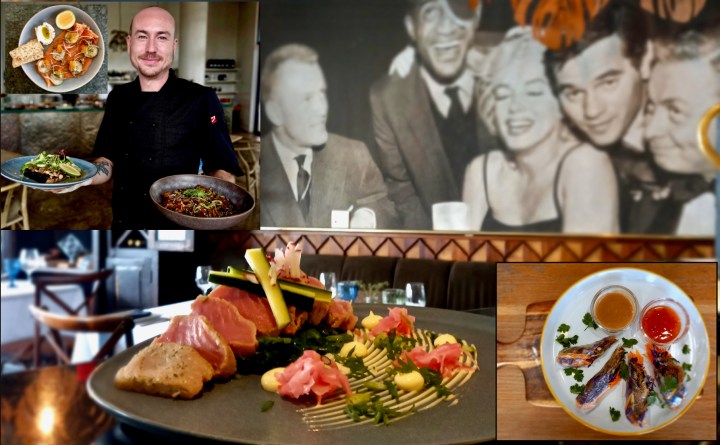
Rowan Larkin. Steve Clements. Margo Uys. Three passionate originals creating distinctive dishes and serving up great flavours with flair and good cheer in inner-city Durban neighbourhoods. A recipe for good times.
How is this for a good food story? Flip back to around 2014. Rowan Larkin — aka Precious Kimchi aka Dashi-Boy, the new head chef (nearly five months now) at Mahā Café in Durban’s Point precinct where he is gently disrupting things and recreating the menu — is living in Cape Town.
He has, by then, trained in French basics at a cookery studio (in Pietermaritzburg, where he was born and raised), dipped in and out of the Cape Town food scene. Then, given he can take a computer apart and build you another one and loves to tinker with such geeky things, similar to how he loves to tinker in a geeky way with food and flavours, has kind of fallen into writing articles about tech, innovation and gaming. This leading to him being an editor, aggregating content, then product manager involved with the whole website at Microsoft SA. (His LinkedIn profile tells the tale.)
“It was a lot of fun,” he says.
Meanwhile, he was cooking, experimenting, actualising his culinary passion at home.
“I had fallen in love with things like kimchi and gyoza. Korean and Japanese had stolen my heart. The flavours and the technique and the complexity you can get with a couple of ingredients.
“I would watch YouTube, read articles, figure it out, browse through books. It was a constant. It felt like an obsession. I was looking at pictures. Wondering. Trying to recreate. A lot of my knowledge comes from self-discovery, exploration and becoming obsessed till I got it right.”
Back then, he had long been on a quest to find the “perfect bite”.
“That one thing you can eat over and over again that gives you the same joy every time, like you’re experiencing it for the first time.”
His partner at the time had been to Hong Kong on business. “She came back and said, ‘I’ve found your perfect bite. But it’s in Hong Kong’.”
So it was that they planned a trip, which took in “Thailand, Vietnam, a little bit of Laos, Cambodia. But it was a trip designed for one sole purpose. To go to Hong Kong and eat a dish called Xiao Long Bao, which means little dragon buns.
“It’s a soup dumpling with gelatinous pork stock (aspic) inside so that when you steam it, what’s inside becomes liquid again and when you eat it, you get this burst from the soup.
“It was most amazing. It’s all-encompassing. It’s got all that nourishing sort of sensation you get from a home-cooked meal and it’s got excitement. You dip it in chilli and the complexity of aged black vinegar. So it’s got all these expressive flavours while still being familiar and warm. And it’s my idea of what the perfect mouthful is.
“The pork and the soup gives it that homely warm richness. The wrapper, steamed, is like a pasta so it’s very rich and nourishing. And then the chilli comes through. If I had to eat one thing for the rest of my life, it would be that.
“And that is something I like to create. Where you bite something and you get taken out of wherever you are and totally into that bite. I think that’s the power food can have.”
Is there something he makes that is similar?
“In terms of flavour, I’d say my dashi, the basic stock the Japanese use. When I came back to Durban, they (chef friends he’s cooked with) called me Dashi-Boy. They’d say there’s always dashi on the menu when Rowan’s cooking.
“It’s quite a delicate thing to get right. If you get the kelp too hot, it goes bitter and acrid. Not long enough, you don’t get the extraction you’re looking for. So when I make dashi, it has the same sensation for me as the Xiao Long Bao, because it’s warm and earthy and complex.
“It makes me think of how, if you took the rock pools, that smell, and you added the flavour of mushroom and soy sauce to give it the richness, the umami flavour.
“It’s like the sea with the ocean and the forests together, which I find incredibly interesting and complex.”
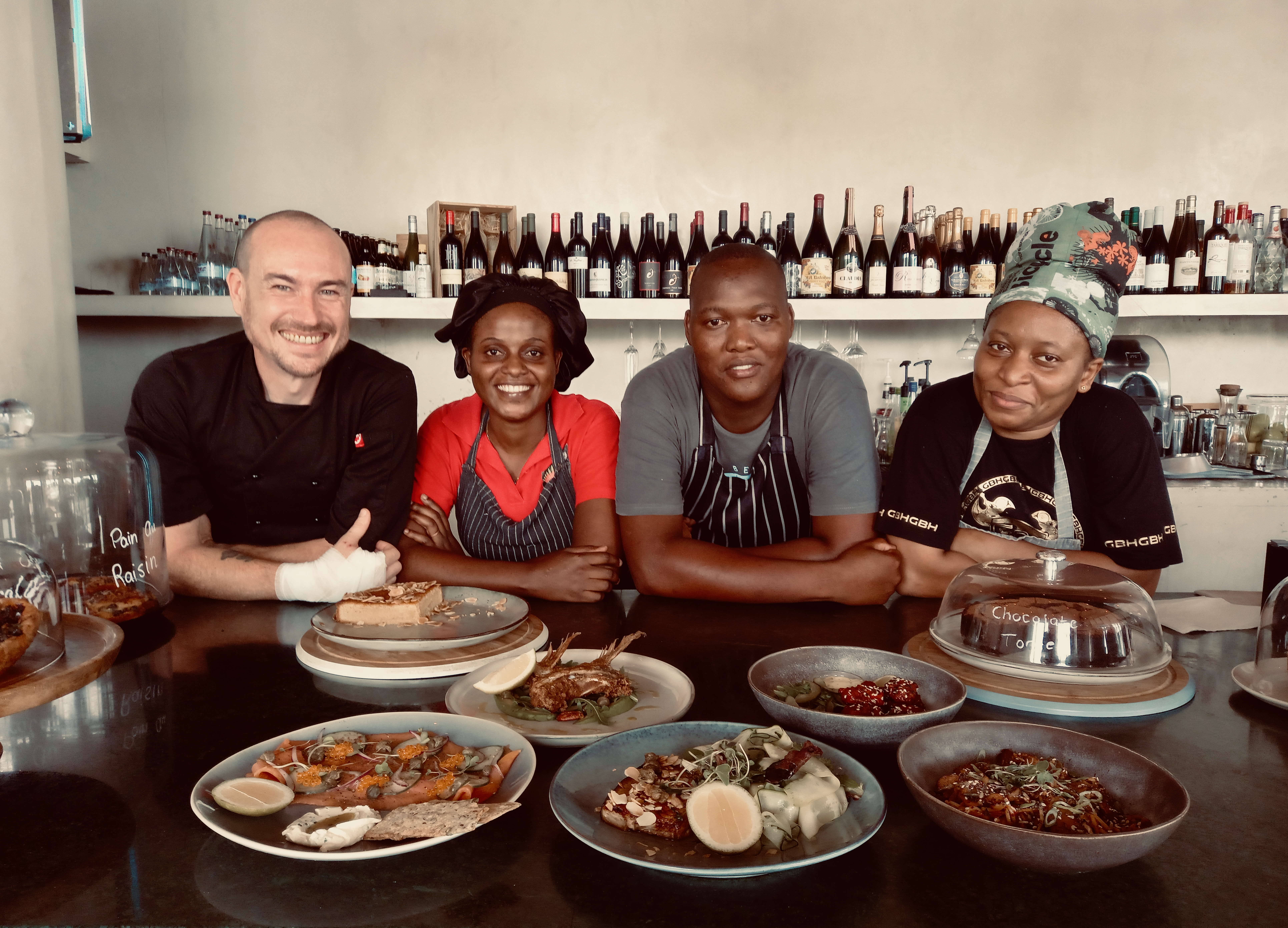
Mahā’s kitchen team with pan-fried swordfish and Szechuan-style noodles, front and right, and from left, Rowan Larkin, Marie-Claire Amunazo, Bhekithemba Msane and Shadia Etoka. (Photo: Wanda Hennig)
Larkin did his straight-from-school cookery diploma at Aubergine Cookery Studio in Pietermaritzburg.
“Between 2002 and 2012, I was running a cookery school. Now, same name, but I just do catering,” says Margie Harel, chef owner, who way back taught “that beautiful child (now 38), who was, is, very cool, as you will know”.
What made him an absolute joy to teach, she says, was, “He was fearless. Never afraid. Always experimented. Tasting everything. You know, if I was to compare him, and I’m certainly not putting him in the realm of Anthony Bourdain, but he is that sort of irreverent maverick. He doesn’t do things according to the rules.
“It was only a three-month cooking course, French-based, because that’s my path.”
Harel did her basics at ML Sultan then honed her skills by way of a bursary at Prue Leith’s in London.
“So my training is completely classical and that’s what I imparted. Very good stock, good sauces and from there you build. I know Rowan went into computers but I’m not surprised he’s back cooking. I can’t wait to go and eat his food.”
When he could no longer ignore his passion, after the Hong Kong trip, and wanting to be closer to his family, who were by then all in Durban, Larkin decided to move back.
“I walked into the Glenwood Restaurant and went to Adam (Robinson) and I said, ‘I want to cook and I want to cook in your kitchen’.
“And he said, ‘I don’t have the space but what about baking?’ So I baked with Adam for nearly two years. It was hard, very difficult, but it made me a better chef because the breads are unforgiving.
“It’s all about timing and temperature and hydration. It gave me a very nice technical knowledge over the breads.” [Read our TGIFood article on Robinson, The art of bread, aroma, flavour and passion.]
From there, in a “fortune favours the bold and the brave kind of way”, Larkin ran kitchens in Umhlanga, Durban and Hillcrest. With highs and lows and at one point, almost kind-of burning out, which sent him back into IT.
On the side doing pop-ups and fine-dining private dinners with friend and fellow chef Constantijn Hahndiek (now in Cape Town). Getting to the point when he once again realised, “I belong in the kitchen. It’s the only place I am happy.”
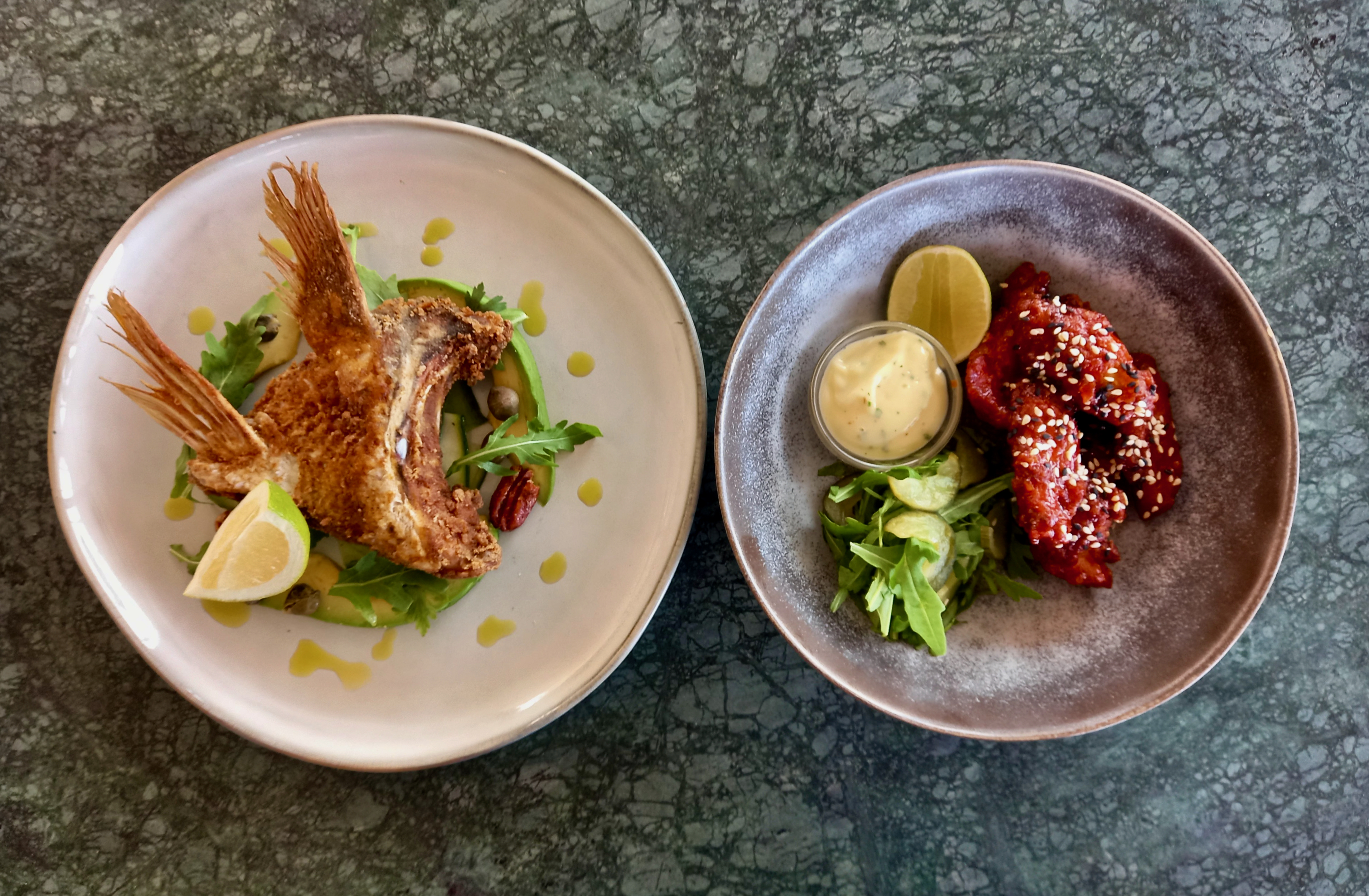
A couple of Chef Rowan’s Mahā specials: fried sea bass collar with avo, rocket and caper salad and his citrus-brined Korean fried chicken wings. (Photo: Wanda Hennig)
When I arrive to chat with Larkin, he has a bandaged hand – what looks like a barbed wire tattoo around his forearm on the opposite arm and scratches that he might have got trying to climb through a hectic bush of thorns. But no. He’s passionate about cats. Has two that were feral, have become, he says, quite loving, but which go back to being feral if he tries to restrain them. Which he had just done, to move them to a new apartment, close to where he’s working.
He was considering going back to Cape Town when approached by Maha owners, Dustin and Farran Hayman, who asked what would it take to get him there?
“I said, I’d just like two days off a week. Nothing complicated,” he laughs.
“And they’re fantastic. I have complete free reign here. It’s very rare in the industry that you are promised free reign and then actually given it. It was perfect timing. It’s going on five months now and slowly slowly, I’m stamping my identity…”
Right away he put his Korean chicken wings on the menu and started testing “all the things I’m passionate about. It’s been a slow progression of adding and removing. Seeing what the clientele like and enjoy.”
His Szechuan-style chilli cumin lamb noodle dish was an early entry.
“Lamb rump and Sichuan peppers and five different types of chilli. The salted chilli we make here. The dried, we do ourselves and blitz it up so you get the smokiness, the fragrance. There’s the Gochugaru, which is like a Korean red pepper (a mild to moderate spicy taste with a hint of sweetness).
“There’s cumin and fresh chopped chillies. Little pops of flavour all over the place, which I think people are enjoying.” (I can vouch for flavour, freshness and deliciousness, not heat, having tried the dish he produced for our picture.)
“I enjoy simple dishes that are flavourful, light, fresh. I don’t think we need to overcomplicate with thousands of different elements. For instance, a straightforward swordfish dish we’re doing now, with caper butter, a bit of lemon.” All the fish, not surprisingly, is sourced from the Bartho Brothers. [Read our TGIFood story, Messing about in boats with the Bartho Brothers.]
“I like to develop my dishes by thinking, what do I want to eat now? What would I want to share and enjoy.”
While the menu surprises and changes and he gets to push his boundaries and play, with the monthly wine-pairing fine-dining tasting menu he leaves certain things as staples.
There are those who want fish and chips (always on the menu when Bartho’s has fresh hake) or a (seared grass-fed KZN beef patty) burger, served on a sesame-seeded Japanese milk bun with dijon, chimichurri, pickled red onion and tomato (plus optional add-ons such as truffled creamed exotic mushrooms) and the beef brisket pastrami Reuben sandwich (on toasted rye sourdough, with smoked cheddar, fermented cabbage, dill pickled cucumber and a Russian dressing).
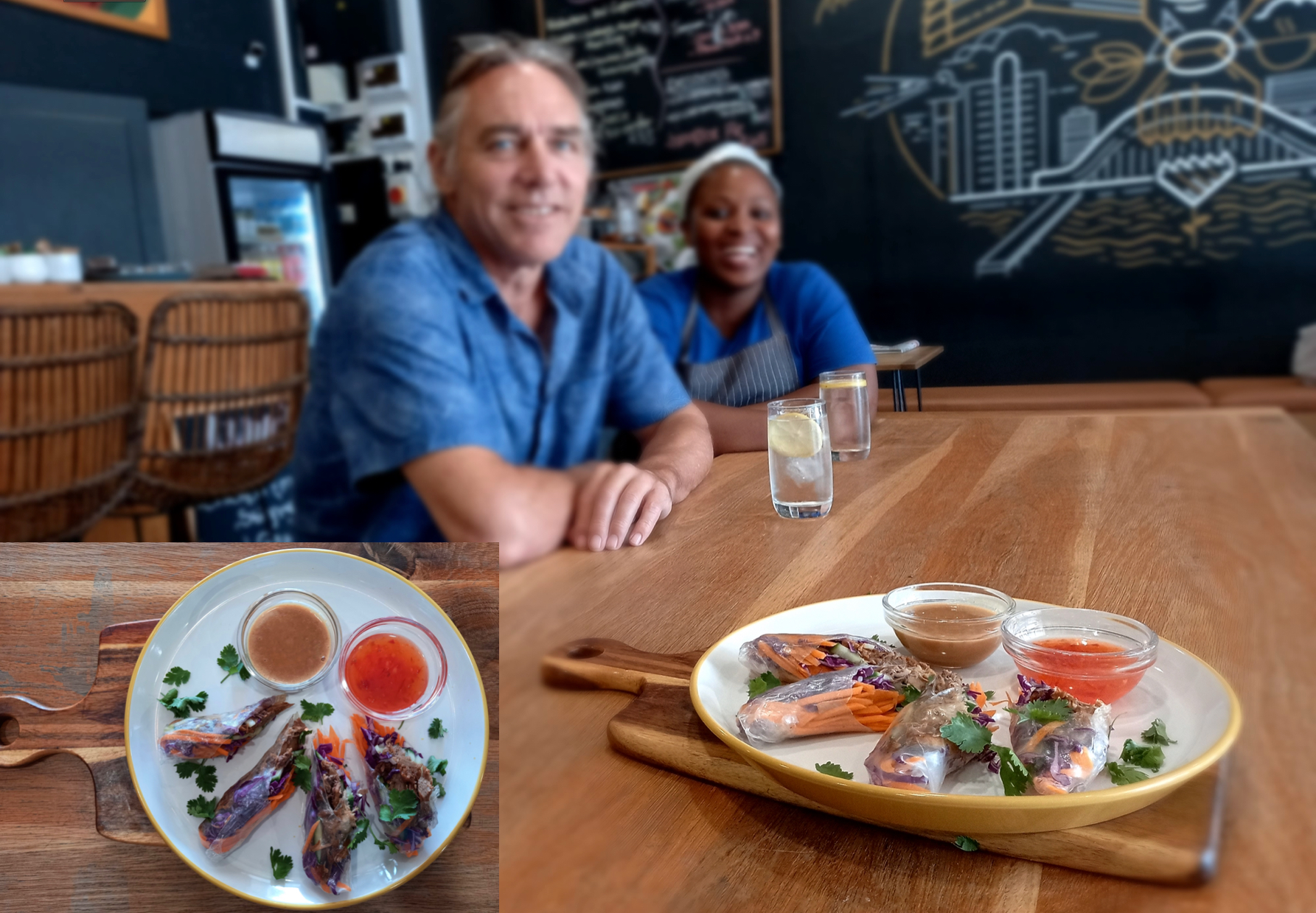
Duck owner-chef Steve Clements and chef Mbali Gwala with a Thai duck summer roll lunchtime special. (Photo: Wanda Hennig)
A well-seasoned restaurateur
Steve Clements. “Passionate palate. Culinary alchemist. Gastro adventurer. Chief cook and bottle-washer at St Clements restaurant where you go for Thai food, Lao food, bistro food…” I lift this directly from an article we ran in 2019. [Read The Extraordinary Journey of Steve Clements.]
While he might look like a surfer dude, Clements is one of Durban’s coolest and most seasoned restaurateurs and the inspiration behind Pink Duck, his cool new venture in the lower hip-and-happening part of Florida Road.
In brief, in our 2019 story we shared that after a “20,000 mile” road adventure across the US, money running out, Clements headed for the UK. There, he spent his last £10 on a Thai green curry dish at a small eatery in Chiswick. Having never thought of cooking as a life path, the next day he was knocking on the restaurant door.
“A couple of days later he had agreed to work for the proprietor, for no money and no food, which marked the start of a circuitous journey that would take him to Thailand and Laos many times to learn, to eat, and open eateries in Durban.
And which saw him, back in 2019, firing up the open-to-the-elements grill he’d built out back at St Clements, his acclaimed Berea restaurant, to cook the speciality dishes he’s passionate about. The crowd-pleasing red duck curry.
The Vietnamese-style crab curry people would return for again and again. His Cambodian beef lok lak, which Clements said, “I guarantee you won’t find in any other restaurant in Africa.”
The grilled pork skewers he learned to make “from a lady on the roadside in Cambodia”.
Now, post-Covid, with Durban night-time suburban dining habits anything but robust, St Clements only opens nights for special events.
Enter Pink Duck at the lower end of high-traffic Florida Road. A Thai-focused take-out with a few tables for eating in. Where you can go nights, take your own wine: “I like to think we’re offering dinner for two for R200 including tip.”
“Usually Thai menus are very big menus,” Clements says. “Kind of hundreds of options and variations, which people can find very confusing and foreign.
“Here, we’ve kind of condensed the menu to get all the tastes and make it simple for people to order. We’ve taken everything I’ve learned over the past 30 years and hand-picked the relevant… Selected about 15 dishes that I think cover all the bases in terms of salty, sour, sweet, hot. Everything is here.”
Special items on the menu? “A great curry.” Green and red; chicken, prawn, beef, vegetable and duck.
“The fried rice is more than the sum of its parts. The laab is a north Thailand/Lao dish, unusual to find on menus here. We’re doing rice-paper-wrapped summer rolls, duck, prawn, chicken or veg, as a summertime lunch special. With a peanut dipping sauce, refined over the years, that is superb.”
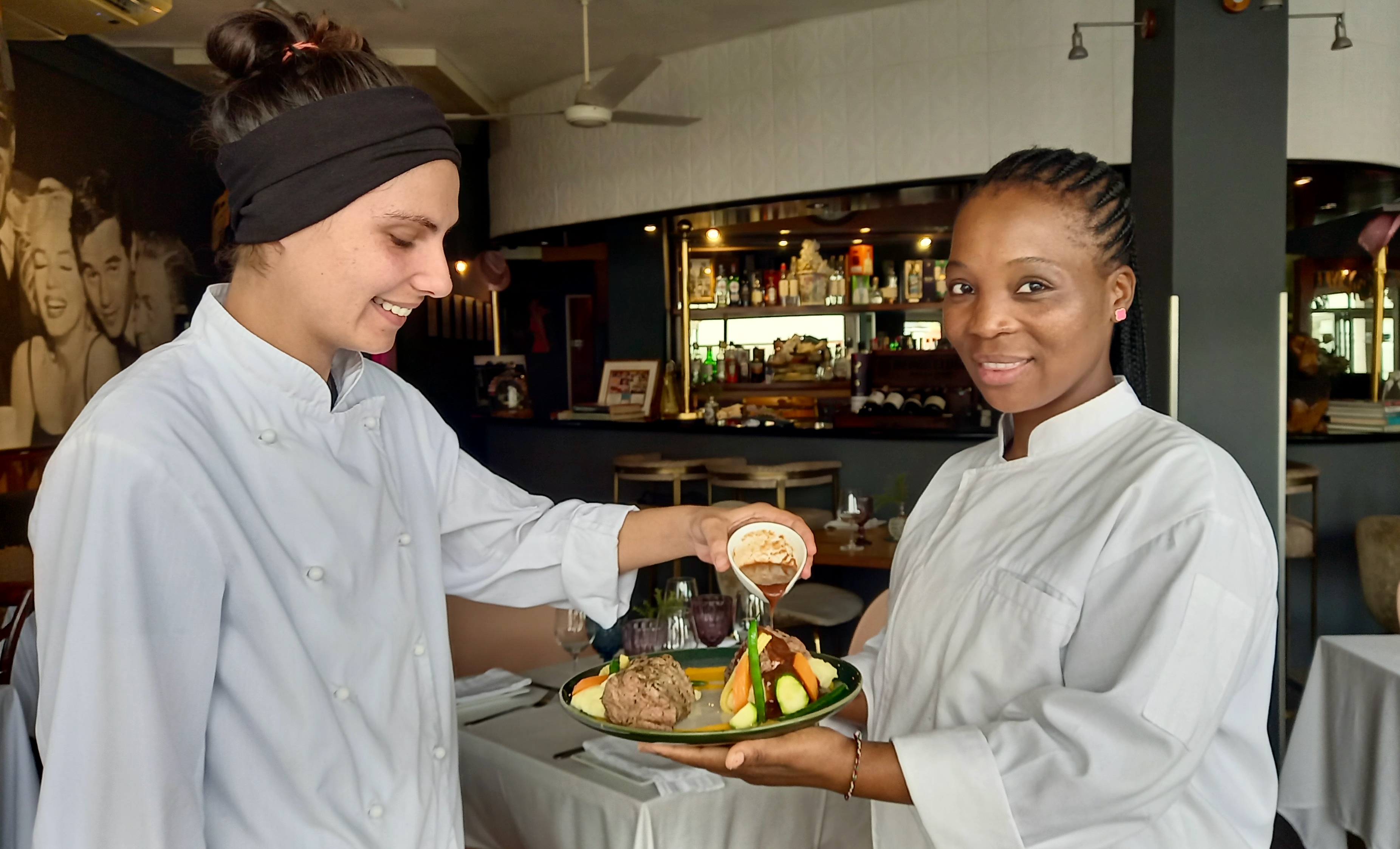
Head chef Margo Uys and assistant chef Dumsile Ndimande finish off this plated beef fillet at Café Monroe. (Photo: Wanda Hennig)
Roots in Durban
Chef Margo Uys is a post-Covid Durban gain. She and her fiance, Craig Sherrell, have opened Café Monroe together at the location of what for many years was the award-winning and acclaimed Café 99 on Durban’s Berea. This, after they lost their three successful Franschhoek eateries to Covid lockdown and made their way to family in Durban.
Sherrell has strong Durban ties. The late legendary and loved Martin Lombard, known as a mentor to many and a restaurant rock star, who opened such acclaimed eateries as Little Havana, Havana, Pintxada, was his brother-in-law.
Café Monroe is Sherrell’s tribune to Marilyn and some of the decor comes from one of their erstwhile popular Franschhoek eateries. (Sherrell had Roca at Dieu Donné Vineyards. Together he and Uys had Café Roca and Marilyn’s. All, while now closed, come up with glowing reviews when you Google.)
I was lucky to get introduced to Café Monroe before it opened three or four blocks from where I live. When Themba Mngoma, one of KZN’s most creative private chefs, who worked for a spell with Sherrell at Roca, invited me there. Since then it has become a favourite.
To sit at the bar counter, as one can; share a bite and a bottle of wine. The place has a kind of a speakeasy feel. There’s jazz on vinyl. Old black ‘n white movies play intermittently outside on the wall. Sherrell is big on the Rat Pack and Marilyn Monroe and Frank Sinatra books lie around.
The menu, encompassing the kind of food Chef Margo likes to cook, has been evolving as the pair get to know the Durban dining scene. Good ingredients. Classic European-style fine-dining. Flavour and creativity. When did I last see snails on a menu? A “trio” in this case, as in prepared with blue cheese, with garlic and lemon and with chilli.
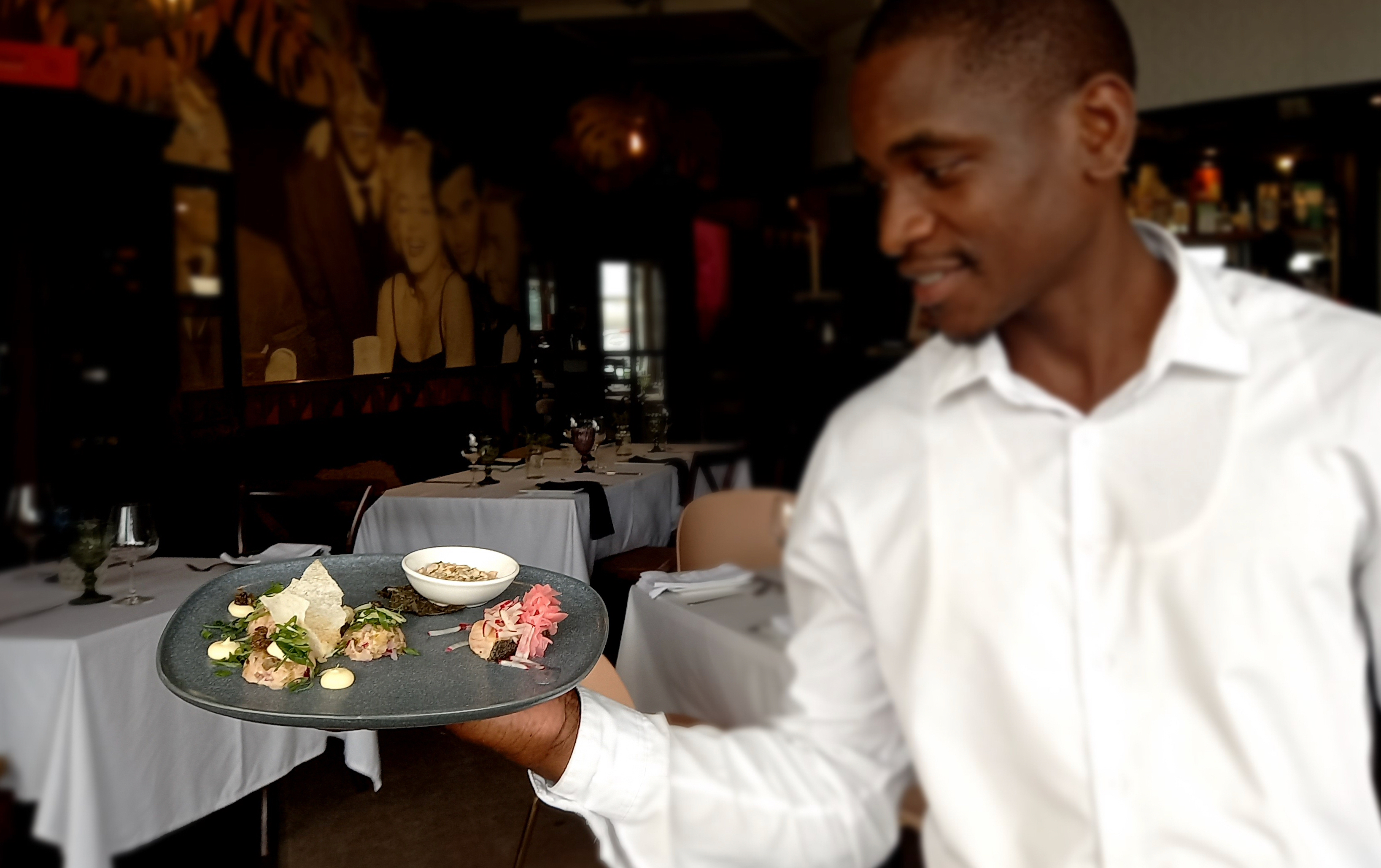
Waiter Vuyo Mhlanga with the Café Monroe trio of salmon: mousse, tartare and grilled. (Photo: Wanda Hennig)
The seared tuna, paired with sautéed spinach, homemade pickled ginger and Japanese mayo is something Uys says she played with and perfected in Franschhoek.
It is up there near the top of the popularity stakes with her beef fillet served with creamy French-style duchess potatoes, roasted veggies and a red wine jus.
How Margo, quietly spoken with a gentle humour and an unguarded kind of vulnerability, got to chef’s school is something of a magical story.
She was doing hospitality as a subject at her Table View high school in suburban Cape Town. A teacher she’s still in touch with (she’s only 27, so it makes sense) started a catering club. An after-school thing.
“While in grades 11 and 12, we catered in-house for all school events.”
In Grade 11, the same teacher told Uys about a catering competition being run, during the holidays, by a cooking school. Entrants had to come up with a SA-focused menu and to include a cold dessert.
Her teacher helped her put a menu together. Uys took it home. Her mom was tasked with the ingredients list. The teenager made the dishes.
“A starter of asparagus spanakopita. A main of ostrich with mash, a red wine jus and if I remember correctly, tender-stem broccoli. The dessert was a cold-set milk tart with macadamia brittle. I have photos somewhere…”
She sent off the pics with the menu and the recipes, all that had been requested, to the national competition. Registering her mom’s words or warning, having seen her daughter’s enthusiasm and anticipating disappointment: “Don’t expect to win.”
But somebody had to, and the call came on the Friday of a long weekend. “They called home and spoke to my mom.”
Now her mom told her to sit down. “They’d called to tell her I’d been chosen as one of the top four out of 120,000 entrants. It was a total surprise.”
The final four were required to do a cook-off of their recipes at the cooking school.
“I truly didn’t think I had a hope in hell.” But two weeks later the call came, again to her mom. This time, to say she had won.
The prize? A bursary to study for a certificate diploma and an advanced diploma in culinary arts.
“My parents were only required to pay about R1,000 in admin fees. The bursary — to study at the SA Chef Training and Innovation Academy — was worth about R250,000.”
Uys finished matric, with colours for catering (and half-colours for cross-country running and drama). Her first industry placement after completing the courses was at De Grendel (wine estate and restaurant).
Fast forward. Her last “job” before teaming up with Sherrell was sous chef at Mont Rochelle in Franschhoek.
Fine dining, good ingredients, European-influenced is her flavour profile, which worked well in Franschhoek where, she says, 90% of the clientele were from Europe.
Their plan was not for another restaurant. Absolutely not a Durban restaurant.
But after Sherrell had flirted briefly with mushroom farming, the pair happened to walk their dog around the corner from where they’d moved into an apartment.
They saw a For Sale sign at their current spot. And there you are. The spirit of Marilyn lives.
And Durban gets to be part of it. DM/TGIFood
Follow Mahā café on Instagram and on Facebook. Follow Rowan Larkin on Instagram. Follow Pink Duck on Instagram. Follow Café Monroe on Instagram and on Dineplan.
Follow Wanda on Instagram wanda_hennig





Comments - Please login in order to comment.